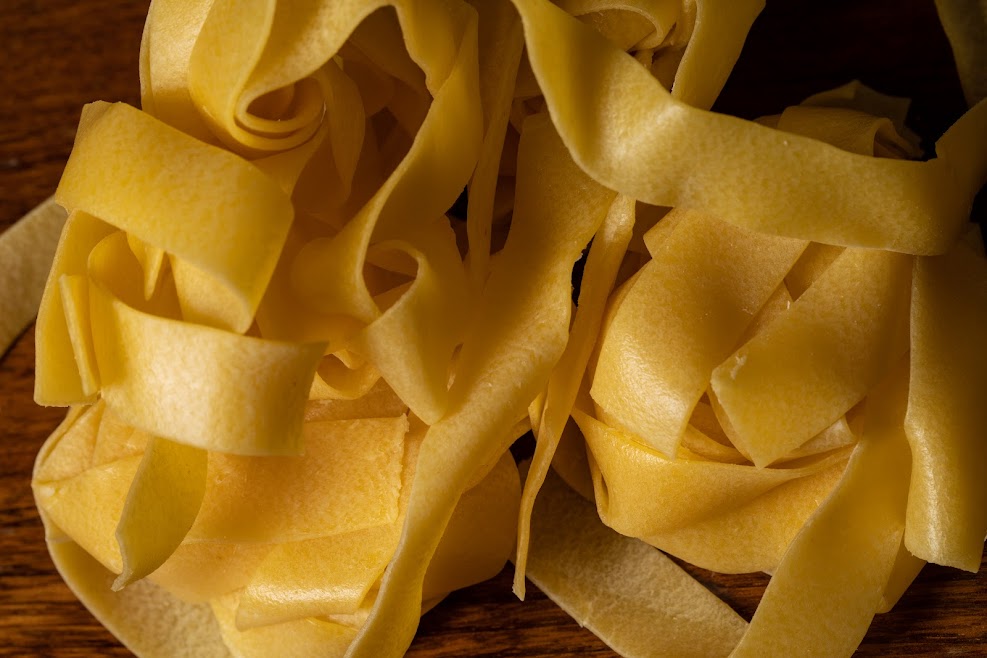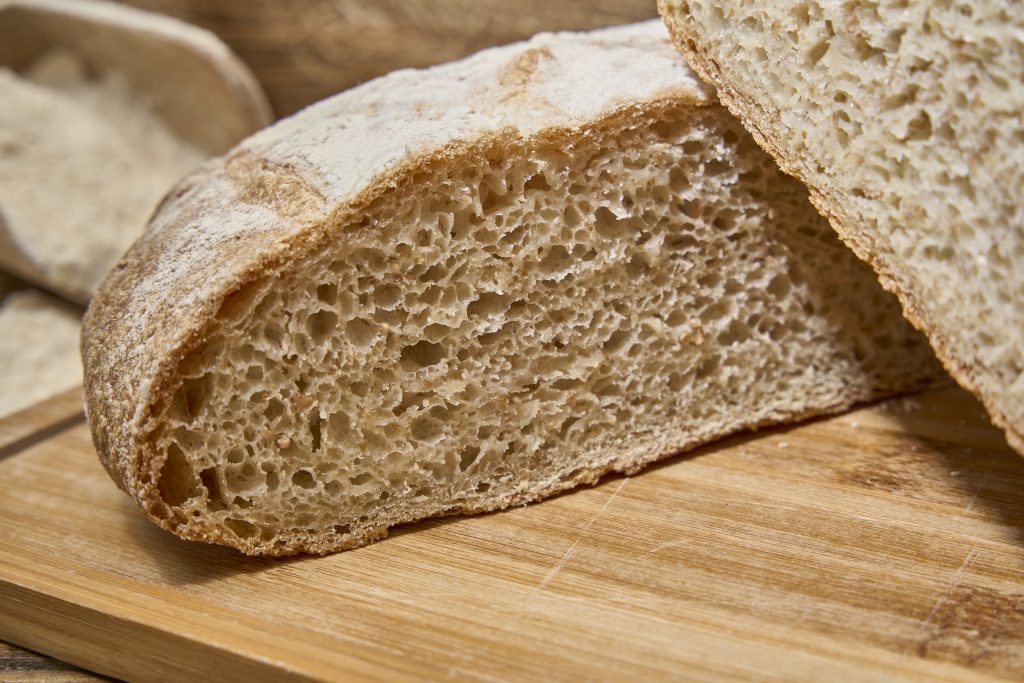15 July 2024
Soft wheat flour and semolina play a crucial role in Mediterranean cuisine by enhancing the flavor, texture, nutritional properties, tradition, and cultural significance of the dishes that make this culinary heritage so rich and diverse. These ingredients are essential for the reasons listed below, and even more so in their organic versions, with their higher nutrient content and deep roots in traditional Mediterranean cuisine and farming methods.
- Texture and Consistency: Soft wheat flour and semolina contribute to the unique textures and consistencies found in many Mediterranean dishes. Semolina, in particular, is often used to make pasta, couscous, and various bread and pastry products, giving them a distinctively chewy and slightly coarse texture.
- Nutritional Value: Soft wheat flour and semolina are relatively nutritious compared to refined flours. They contain essential nutrients, such as protein, fiber, vitamins, and minerals, which are important for overall health and well-being. These ingredients add nutritional value to dishes without compromising taste or texture.
- Culinary Tradition: Soft wheat flour and semolina have been used in Mediterranean cookery for centuries and are deeply ingrained in the culinary traditions of the region. Many classic dishes, such as Italian pasta, Moroccan couscous, Greek semolina cake, and Turkish bread, rely on these ingredients for their authenticity and flavor profiles.
- Versatility: Soft wheat flour and semolina are versatile ingredients that can be used in a wide range of dishes, from savory to sweet. They can be used to make pasta, bread, pizza dough, cakes, desserts, and more, showcasing their adaptability and flexibility in various culinary applications.
- Cultural Significance: Soft wheat flour and semolina have a real cultural significance in the Mediterranean region, where food plays a central role in social gatherings, celebrations, and daily life. By using these traditional ingredients, cooks and chefs are able to connect with their heritage and preserve culinary customs that have been passed down through generations.
In recent years, there has been a noticeable shift towards organic food choices due to concerns about health, environmental impact, and sustainability. Therefore, when it comes to baking and cooking Mediterranean dishes, organic soft wheat flour and organic semolina have become increasingly popular options.

Nutritional Benefits of Organic Soft Wheat Flour and Organic Semolina.
- Higher Nutrient Content: Organic soft wheat flour and organic semolina are known to have a higher nutrient content compared to their conventional counterparts. This is because organic farming practices focus on maintaining soil health, which results in crops that are more nutrient-dense.
- Free from Harmful Chemicals: Organic soft wheat flour and organic semolina are produced without the use of synthetic pesticides, herbicides, or fertilizers. This means that they are free from harmful chemicals that can potentially accumulate in our bodies and have negative health effects over time.
- Richer in Antioxidants: Studies have shown that organic crops, including organic wheat used for flour and semolina, tend to contain higher levels of antioxidants. Antioxidants play a crucial role in protecting our cells from damage caused by free radicals, thus reducing the risk of chronic diseases.
Environmental Benefits of Organic Farming.
- Soil Health: Organic farming practices focus on building and maintaining soil health through techniques such as crop rotation, composting, and the use of natural fertilizers. Healthy soil leads to better-quality crops and ensures the long-term sustainability of the land.
- Conservation of Biodiversity: Organic farming promotes biodiversity by avoiding the use of synthetic chemicals that can harm beneficial insects, birds, and other wildlife. By preserving natural ecosystems, organic farming contributes to a healthier environment.
- Reduced Environmental Impact: Organic farming produces lower carbon emissions and has less impact on water quality compared to conventional farming. By choosing organic soft wheat flour and semolina, consumers can support environmentally-friendly practices.
Taste and Quality: Many chefs and home cooks prefer organic soft wheat flour and organic semolina for their superior taste and texture. Organic grains are often fresher and retain more of their natural flavor, resulting in richer and more aromatic baked goods and pasta dishes.
In short, incorporating organic soft wheat flour and organic semolina into your daily diet can not only provide you with a range of health benefits but also support sustainable and environmentally-friendly farming practices. By making a conscious choice to opt for organic products, you are not only nourishing your body but also contributing to a healthier planet.
Here is a selection of recipes that use organic soft wheat flour and semolina for authentic Mediterranean dishes.
1. Homemade Pasta:
Ingredients:
- 2 cups organic soft wheat flour
- 2 eggs
- Pinch of salt
Instructions:
- Heap the organic soft wheat flour onto a clean work surface and make a well in the center.
- Crack the eggs into the well and slowly incorporate the flour until the dough comes together.
- Knead the dough for a few minutes, then let it rest for 30 minutes.
- Roll out the dough and cut it into your desired pasta shape (such as fettuccine, tagliatelle, etc.).
- Cook the pasta in boiling water until al dente.

2. Semolina Bread:
Ingredients:
- 2 cups organic semolina flour
- 1 cup warm water
- 1 tsp yeast
- Pinch of salt
Instructions:
- Dissolve the yeast in warm water and leave to stand for 5 minutes until frothy.
- Mix the organic semolina flour, salt, and yeast mixture to form a dough.
- Knead the dough for about 10 minutes, then leave to proof for 1 hour.
- Shape the dough into a loaf and leave to rise again for 30 minutes.
- Bake the bread in a preheated oven at 375°F (190°C) for 30-40 minutes until golden brown.

3. Orange Semolina Cake:
Ingredients:
- 1 cup organic soft wheat flour
- 1 cup organic semolina
- 1 cup sugar
- 1 cup orange juice
- 1/2 cup olive oil
- Zest of 1 orange
- 1 tsp baking powder
Instructions:
- Preheat the oven to 350°F (180°C) and grease a cake pan.
- Mix the organic flour, semolina, sugar, baking powder, and orange zest in a bowl.
- Add the orange juice and olive oil and mix until well combined.
- Pour the batter into the cake pan and bake for 30-35 minutes until an inserted toothpick comes out clean.
- Allow the cake to cool before serving.

These recipes showcase the versatility of organic soft wheat flour and organic semolina in creating delicious and authentic Mediterranean dishes.
Make the switch to organic soft wheat flour and organic semolina today and experience the difference in taste, quality, and overall well-being.
